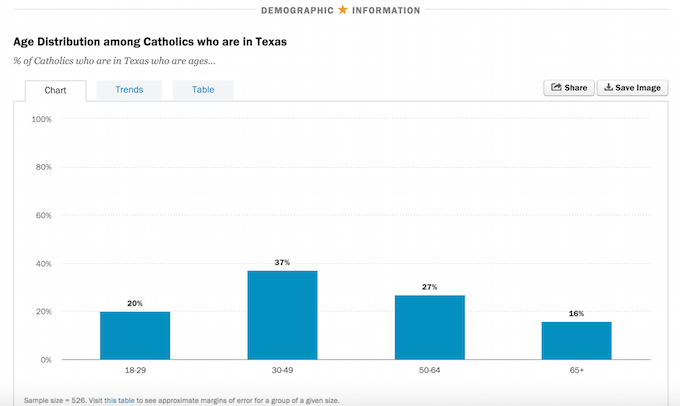
There are a lot of shifting demographics within Texas, but one of the more unexpected changes in the state’s makeup comes via a survey from the Pew Research Center, which polled Americans from around the country about their religious affiliation. The study found that Americans across the board are generally less religious—or at least, less likely to identify with a specific religion—than in years past. And the trend isn’t restricted to those godless, liberal coasts: a larger percentage of Texans identified their religion as “none” in 2014 than Americans did generally in 2007.
Eighteen percent of Texans claimed no religion in 2014, which is lower than the national average of 22.8 percent who did the same. Even though a comparable number for how Texans identified in the past wasn’t immediately available, it’s clear that it’s probably gone way up: in 2007, only 16.1 percent of Americans claimed “none” as their religion, and it’s extremely improbable that Texans were less religious eight years ago than the country at large.
In other words, when discussing shifting demographic trends in Texas, getting less religious is probably one of them. While other states fall along the trends one might expect (“none” is the religion of 38 percent of people in Vermont), looking at what drives the numbers in Texas offers a few surprises.
To start with, Texas is the youngest state in the U.S. by some margin—42 percent of adult Texans are between the ages of 18 and 29, which is a full two percentage points more than the next closest state (Georgia), and four points in front of the states tied for third place. And it’s not just a stereotype that young people are less religious than their elders: the data proves it.
Most of the “nones” are young—as noted, 42 percent are between 18 and 29, and another 38 percent are between 30 and 49. Meanwhile, 44 percent of Christians in Texas are over 50, and only 20 percent of Texans who identify as Christian are under the age of 30. Those numbers hold up across a variety of Christian faiths too: evangelicals, Catholics, and historically black Protestants are all within a few points of each other when it comes to those numbers.


Those percentages might be frightening for Christians worried about Texas youth losing their religion, but it’s worth pointing out that the population numbers we’re talking about here are very large: there are 19.78 million Texans over the age of 18 (which this study focuses on), and 77 percent of them identify as some sort of Christian. That means that even if only 20 percent of Texans between the ages of 18 and 29 identify as Christian, we’re still talking about 3.04 million people.
When we talk about the 18 percent of Texans who identify as unaffiliated, meanwhile, we’re talking about a pool of 3.56 million total, across all age groups. But the 42 percent of them who are between 18 and 29 is good for 1.49 million people.
In other words, among young Texas adults, Christians outnumber their more secular neighbors by a two to one ratio. One can interpret that number in a few ways, but it’s roughly the same ratio of Christians to “nones” that you’ll find in New York.
What’s also interesting is that, for the most part, these ratios are fairly consistent among racial demographics, at least among the two largest groups—whites and Latinos—in Texas. For both Christians and the unaffiliated, 35 percent of each group is Latino, while white people make up 48 percent of Christians and 49 percent of “nones.” (A smaller percentage of black Texans identify as “none” than identify as Christian.)
It’s also important to note that those who identify with no religion in Texas aren’t necessarily nonbelievers: of the “nones,” only a little more than a quarter identify as atheists or agnostic, while the majority gave a response of “nothing in particular” (and more than half of the “nothing in particular” respondents said that religion was important to them). So this may have less to do with belief and more to do with identification. If you’re a regular churchgoer, you probably answer a question like this with whatever the sign says on the outside of your church. If you haven’t been to church in a while but you still consider yourself a believer, “nothing in particular, but religion is important to me” is a likely answer.
When it comes to non-Christian religions in Texas, meanwhile, the numbers are still very small: only 1 percent of Texans are Muslim, Buddhist, or Jewish, and the percentages get even smaller with faiths like Hindu or what Pew classifies as “New Age” religions, all of which are less than a percentage point each. But the rising number of Texans who identify their religion as “none” is a demographic trend worth keeping an eye on.







